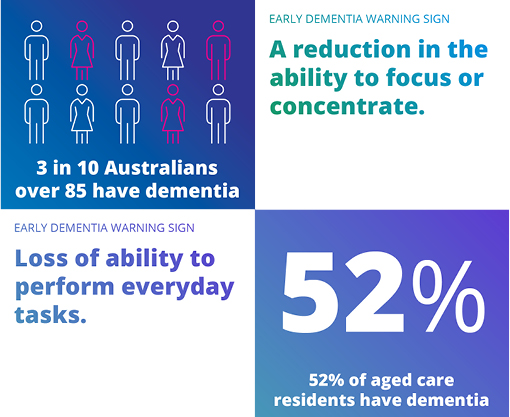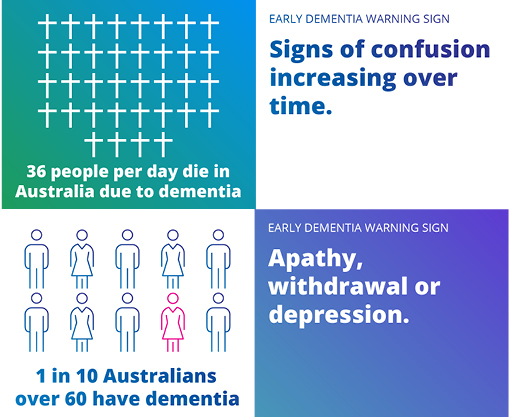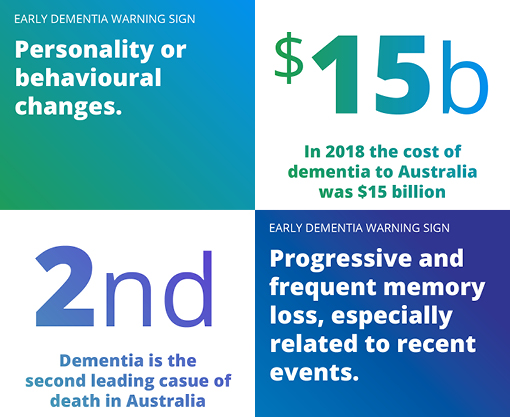Does hearing loss cause dementia?

This article was originally published in September 2021 and updated with the latest research and information in August 2022 and August 2023 (two new studies added, and the latest Australian and international statistics included). In April 2024, we added the Hearing Tracker video with a panel discussing current research and what it actually means.
Reality or fear-mongering?
Over recent years, more and more media coverage has been seen talking about the link between hearing loss and dementia. Some hearing aid providers even promote their devices based on this media coverage.
Understandably, this can provoke fear or anxiety that if you don’t get hearing aids, you may develop dementia.
But what does the research say, and why is there an increased focus on this link in recent times?

What is dementia?
Before we begin, it’s good to understand what dementia is and isn’t. Dementia is not a specific disease, but several diseases can cause dementia, including Alzheimer’s – the most common cause of progressive dementia.
Dementia is a general term describing symptoms affecting brain function, including your memory, ability to think, and the ability for social interaction.
You may be surprised and horrified to know that end-stage dementia is one of the leading causes of death in the Australian population.
According to Dementia Australia, in 2023, more than 400,000 Australians are living with dementia. That number is expected to increase to almost 1.1 million by 2058 unless a medical breakthrough is discovered.
Dementia in Australia
- Dementia is the second leading cause of death of all Australians, and provisional data shows that dementia will likely soon be the leading cause of death.
- Dementia is the leading cause of death for women.
- In 2023, it is estimated there are more than 400,000 Australians living with dementia. Without a medical breakthrough, the number of people with dementia is expected to increase to more than 800,000 by 2058.
- In 2023, it is estimated there are more than 28,650 people with younger onset dementia, and this is expected to rise to more than 42,400 people by 2058. This can include people in their 30s, 40s and 50s.
- In 2023, it is estimated that more than 1.5 million people in Australia are involved in the care of someone living with dementia.
- 2 in 3 people with dementia are thought to be living in the community.
- Over two-thirds (68.1%) of aged care residents have moderate to severe cognitive impairment.
Dementia around the world
In March 2023 the World Health Organisation published the following key facts:
- Currently more than 55 million people have dementia worldwide, over 60% of whom live in low-and middle-income countries. Every year, there are nearly 10 million new cases.
- Dementia results from a variety of diseases and injuries that affect the brain. Alzheimer disease is the most common form of dementia and may contribute to 60–70% of cases.
- Dementia is currently the seventh leading cause of death and one of the major causes of disability and dependency among older people globally.
- In 2019, dementia cost economies globally 1.3 trillion US dollars, approximately 50% of these costs are attributable to care provided by informal carers (e.g. family members and close friends), who provide on average 5 hours of care and supervision per day.
- Women are disproportionately affected by dementia, both directly and indirectly. Women experience higher disability-adjusted life years and mortality due to dementia, but also provide 70% of care hours for people living with dementia.
What are the early symptoms of dementia?
Dementia symptoms start subtly and can be hard to spot initially. Watch for the signs below to recognise dementia as early as possible.
- Progressive and frequent memory loss, especially related to recent events
- Signs of confusion increasing over time
- Personality or behavioural changes
- A reduction in the ability to focus or concentrate
- Apathy, withdrawal or depression
- Loss of ability to perform everyday tasks.
Remember that displaying some or all these symptoms may not necessarily indicate dementia, but it is best to investigate and identify the causes as early as possible.
What causes dementia?
Since dementia is not a specific disease, the symptoms of dementia can be caused by several different disorders, the most common of which is Alzheimer’s disease.
Other causes include:
- Vascular dementia
- Parkinson’s disease. Dementia is common in people with this condition.
- Dementia with Lewy bodies
- Frontotemporal dementia
- Severe head injury
- Huntington’s disease
- Leukoencephalopathies
- Creutzfeldt-Jakob disease
- Some cases of multiple sclerosis (MS) or amyotrophic lateral sclerosis (ALS).
- Multiple-system atrophy
- Infections such as late-stage syphilis
- Inherited dementia
It’s important to remember there are several causes of dementia, and depending on the cause, some symptoms may be reversible.

The link between hearing loss and dementia
Looking at the causes above, we don’t see ‘hearing loss’ listed explicitly as a cause of dementia. So how has hearing loss been connected to dementia, and why are some organisations touting hearing loss treatment as a preventative measure for dementia?
While a tenuous link between hearing loss and dementia was suggested as far back as the late 1980s, it was a 2020 report in The Lancet that really put the link in the spotlight.
The document Dementia prevention, intervention, and care: 2020 report of the Lancet Commission highlighted 12 things (risk factors) that people could modify that might prevent or delay up to 40% of dementias.
One of those things was encouraging hearing aid use for hearing loss and reducing hearing loss by avoiding excessive noise exposure.
This key message was reported by media organisations worldwide and picked up and amplified by hearing aid manufacturers and resellers.
Before we go any further, it is important to understand that this risk factor was just one of many that could potentially reduce the likelihood of developing dementia over time. The researchers also identified at what life-stage risks should be addressed to have the most significant impact on dementia outcomes.
These modifiable risk factors and life-stages are:
- Attain a high level of education (Early Life)
- Treat hearing impairment (Midlife)
- Minimise diabetes (Later life)
- Treat hypertension (Midlife)
- Prevent head injury (Midlife
- Reduce midlife obesity (Midlife)
- Avoid excessive alcohol (Midlife)
- Stop smoking (Later life)
- Reduce air pollution (Later life)
- Maintain frequent exercise (Later life)
- Reduce the occurrence of depression (Later life)
- Maintain regular social contact (Later life)
While treating hearing impairment is just one of the 12 modifiable risk factors, it was ranked as the highest modifiable risk out of the 12 at 8%. The next closest was smoking at 5%.
If all risks were modified or eliminated, it could reduce the risk of dementia by 40%.

What does research about dementia and hearing loss actually say?
Research has come to light that is strong enough for the writers of the Lancet report to include hearing loss as one of the risks for dementia. And what was once a tenuous link appears to be getting stronger and stronger.
New research in 2023
A new study from the Johns Hopkins Bloomberg School of Public Health revealed that older adults with more severe hearing loss have a higher likelihood of dementia; however, the study also found that dementia risk is lower among hearing aid users compared to non-users.
This nationally representative study analysed data from over 2,400 older adults and aligns with previous research indicating a potential link between hearing loss and dementia risk over time.
While the study does state the importance of addressing hearing loss as a public health issue and suggests that treating hearing loss could contribute to lowering the risk of dementia, it uses qualifying language like “may” or “might” when talking about whether it is hearing loss that is the cause of dementia.
Published in the Lancet in April 2023, another study has found that people with hearing loss and no hearing aids were found to have a 42% higher risk of dementia compared to those without hearing loss.
However, those with hearing loss using hearing aids didn’t show an increased risk (4% higher risk). This positive effect of hearing aids was seen across different types of dementia. Around 30% of dementia risk due to hearing loss was estimated. Among the benefits of using hearing aids, 1.5% was linked to less social isolation, 2.3% to reduced loneliness, and 7.1% to improved mood.
The researchers stated that in people with hearing loss, “hearing aid use is associated with a risk of dementia of a similar level to that of people without hearing loss”. With the postulation that up to 8% of dementia cases could be prevented with proper hearing loss management, they also highlighted the urgent need to take measures to address hearing loss to improve cognitive decline.
This seems to be a strong statement in support of the hypothesis that the link between hearing loss and some dementia outcomes is causal, however the researchers hedge their bets by including the following statement: “If causality is established hearing aids could present a minimally invasive, cost-effective intervention to mitigate all or at least some of the effect of hearing loss on dementia.”
They also stated: “Well-designed clinical trials are needed to assess the effect of hearing aid use in dementia risk and to qualify the role of types of hearing aids and length of hearing aid use for the prevention of dementia in different types of hearing impairment.”
Previous research
A recent study of over 382,000 participants in Korea found that for those over 65 with severe or profound hearing loss, the likelihood of getting dementia increased by 1.3 times.
Their results showed that for those under 65, with severe or profound hearing loss, the risk was greater at 1.6 to almost two times the likelihood of developing dementia.
In a review and analysis of research studies related to the link between dementia and hearing loss carried out in 2018, researchers found “age-related hearing loss was significantly associated with decline in all main cognitive domains and with increased risk for cognitive impairment and incident dementia.”
The researchers analysed 36 different studies and over 20,000 unique participants and found the studies confirmed that age-related hearing loss is a possible modifiable risk factor for cognitive decline.
Another study in the UK published in 2021 looked at the association between speech-in-noise (SiN) hearing impairment and the increased risk of incident dementia.
This study was an interesting deviation from other research as studies have previously focused on pure-tone audiometry for measuring hearing loss associated with dementia. People who suffer from a speech-in-noise impairment may present as normal hearing when tested using just pure-tone tests.
The study looked at over 82,000 dementia-free patients 60 years or older. Over 11 years, researchers followed these participants and, by the end of the study, concluded that out of the 1,285 participants who developed dementia, 61% had an increased risk of dementia due to SiN hearing loss.
They stated: “SiN hearing impairment is independently associated with incident dementia, providing further evidence for hearing impairment as a potential modifiable dementia risk factor.”
These are just a few of the studies highlighting the association between untreated hearing loss and the incidence of dementia. A quick Google search for scholarly articles on “hearing loss and dementia” brings up over 157,000 results, with over 6,200 of those being made available in 2021 alone.
Correlation vs Causation
While new research has been added to the cannon of information we have on dementia and hearing loss in the past year, we still have to be careful with our interpretations.
There certainly appears to be a correlation between hearing loss and dementia, researchers are still pointing out that we still don’t know if correlation equals causation in this case. Even the original Lancet report was hesitant, stating only that: “Hearing loss might result in cognitive decline through reduced cognitive stimulation.”
While it is much harder to prove causality in human subjects, some research has been conducted in animal subjects that shows a relationship between induction of hearing loss and cognitive decline. However, the researchers were not willing to state that the hearing loss was the sole cause of the cognitive decline or enough to trigger an ongoing degenerative process such as Alzheimer’s.
In April 2024, Hearing Tracker released a great video discussing these findings and what it actually means. It’s an easily digestible message you can view below.
What do we know?
Again in 2023 we are still looking for the study or research that will comprehensively show that a causal link exists between hearing loss and dementia. But it seems that is still to appear.
We know there is a stronger and stronger correlation between hearing loss and dementia. Some studies show that this correlation is more substantial depending on the severity of the hearing loss and the age at which it presented itself.
We also know that, along with treating hearing loss, other modifiable risks, like social interaction and depression, can also be affected by hearing loss. It has long been established by studies of people suffering from hearing loss that untreated hearing loss can lead to greater social isolation and depression.
So, in effect, this means that by diagnosing and treating hearing loss early, we can effectively help modify three of the risk behaviours listed in the Lancet report. These three risk factors alone accounted for 16% of the 40% increased risk attributed to the 12 risk factors identified above.
Hearing aids and dementia
Here’s what we also know thanks to the Lancet report mentioned previously:
- A 25-year study of 3,777 people aged 65 years or older found increased dementia incidence in those with self-reported hearing problems except in those using hearing aids.
- Another study found hearing loss was only associated with worse cognition in those not using hearing aids.
- A survey of 2040 people older than 50 years, tested every two years for 18 years, found immediate and delayed recall deteriorated less after initiation of hearing aid use, adjusting for other risk factors.
- Hearing aid use was the largest factor protecting from decline.
The Lancet researchers stated that the long follow-up times in these prospective studies suggest hearing aid use is protective, rather than the possibility that those developing dementia are less likely to use hearing aids.
In a new study, published in 2022, researchers in Japan found that regular hearing aid use may have a protective effect on cognitive impairment in those with moderate hearing loss. This finding came from a study of 1163 people with hearing loss over the age of 60.
They also found that hearing level remained a primary risk factor for cognitive impairment among elders with hearing loss after adjusting for several confounding factors.
In another study published in January 2022, researchers analysed the New York Statewide Planning and Research Cooperative System (SPARCS) database for links between hearing loss and dementia.
SPARCS collects patient-level detail on patient characteristics, diagnoses and treatments, services, and charges for each hospital inpatient stay and outpatient (ambulatory surgery, emergency department, and outpatient services) visit; and each ambulatory surgery and outpatient services visit to a hospital extension clinic and diagnostic and treatment center licensed to provide ambulatory surgery services.
The researchers looked at data from 2007 to 2017, which included over 206,000 people over the age of 60 – 56,523 with hearing loss and 150,278 without.
Their findings: hearing loss diagnosis was associated with an increased risk of incident dementia based on the data contained in SPARCS. Individuals with a more established diagnosis of hearing loss (eg more hearing loss claims) demonstrated an increased hazard ratio.
What would we recommend?
In 2021, we said there was enough evidence to show the benefits of treating hearing loss in relation to the risk factors of dementia.
The new studies we have cited above seem to add more weight to this argument. These were not small sample studies either, adding gravitas to the findings.
As always, add to that the benefit better hearing can give to the overall quality of life, and the case is even clearer.
Irrespective of whether or not we have the final word on causal linkages, we would encourage anyone to seek testing and treatment for hearing loss the moment they (or their family members) realise that their hearing is not as good as it has been.
There are only positives to be had.
The Australian Government provides free testing and quality hearing devices to eligible pensioners through its Hearing Services Program. The program is delivered by thousands of audiologists throughout the country, so you can find one you trust close to you.
If you are not an eligible pensioner and your hearing loss is severe enough, you may qualify for NDIS funding.
Failing that, and you do not have the ability to afford hearing aids, BHA offers the Hearing Access Program, which helps people access lower-cost, refurbished quality hearing devices.





